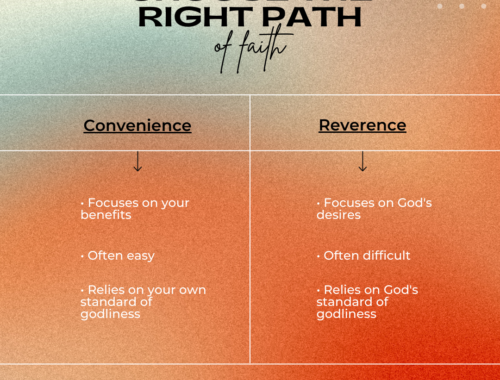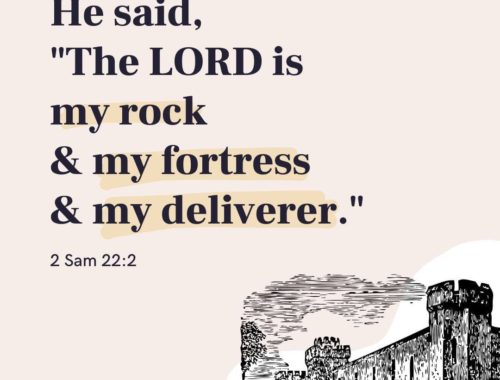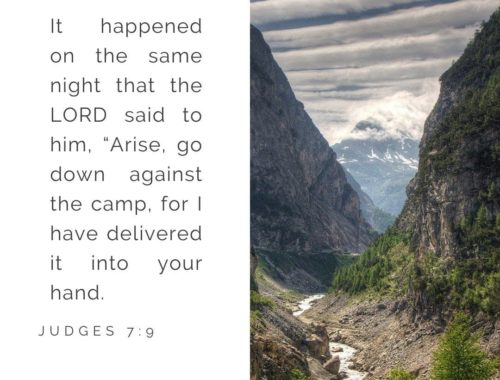Judges Chapter 4
Short Note on the Book of Judges –
The time of Judges was a dark and sinful one, a time when ‘everyone did what was right in (their) own eyes’ (Judges 21: 25), a time when ‘the children of Israel (repeatedly) did evil in the sight of the LORD’ (Judges 4: 1), and as a consequence of their sin, a time when ‘the children of Israel (also repeatedly) cried out to the LORD (in repentance, for being) harshly oppressed’ by the surrounding Gentile nations (Judges 4: 3) that they failed to completely conquer from the time of Joshua (Judges 1).
This vicious cycle of sin (there were 7 cycles in total) 🡪 oppression (God allowed Israelites to be oppressed) 🡪 repentance (reminder to Israelites to return to God) 🡪 deliverance (by a judge appointed by God) 🡪 peace (short-lived as Israelites take God’s mercy for granted, neglect God’s law, and restart their cycle of sin), is in stark contrast to Israel’s single-minded declaration of fear and obedience to God in the last 2 books of Joshua before Joshua’s death (Joshua 24: 16-25).
The time of judges is eerily reflective of today’s society; the structure of the book reflective of:
- The fact that many still live only according to what is pleasing in their own eyes instead of what is truly pleasing in God’s eyes
- Daily cycle of being in the world, making mistakes along the way, carrying hidden sins we might not even be aware of in our hearts, paying the price for our weaknesses, and coming back to God in prayer and our daily devotions for spiritual deliverance (mercies are new every morning, Lamentations 3: 22-24)
- Weekly cycle of toggling between being in the world and coming back to God to be renewed in Him on Sabbath
Despite the overall conveyance of chaos from the book of Judges (stemmed from Israel’s failure at becoming and remaining as God’s holy people), the book still manages to seize small pockets within the cyclical nature of its literary design to remind readers that a backdrop of hope in the present and for the future still hangs, that because ‘in those days, there was no king in Israel; everyone did what was right in (their) own eyes’, God was going to provide a king to point Israel back to doing what was right in God’s eyes, and in time to come, the only One capable of providing an infallible way of escape and salvation for His chosen people.
Judges 4
Keeping this general understanding of the book at the back of our minds, the undeniable godliness of one of the main Bible characters in this and the following chapter is indeed exceptional. Hence, the topic of discussion in this sharing will be on the learnings from the character of Deborah.
- Indisputable trustworthiness (trustworthiness that speaks for itself) and finding favour in the eyes of God and man – Deborah was the only female judge mentioned in the Bible. Her primary roles included ruling and administering justice, settling disputes/controversies, and liberating and delivering the Israelites.
She judged Israel from under the palm tree of Deborah and the children of Israel brought themselves to her for judgement (Judges 4: 4-5). In the 60 years that she was judge over Israel, the Bible has no records of any dissent or rebellion against her, and no records of her having to go out to check on the Israelites; the Israelites saw her as their mother (‘mother of Israel’), as a woman chosen by God to care for and deliver His people, and sought after her without reservation.
- Righteousness fuelled by godly wisdom – The righteousness of Deborah in such a turbulent era is subtly conveyed through the significance of the Bible’s explicit inclusion of the fact that she judged Israel from under a palm tree.
Palm trees represented godly wisdom (1 Kings 6: 29, 32), the flourishing of the righteous (Psalm 92: 12), the uprightness/fairness/refusal to show partiality (Jeremiah 10: 5), and palm branches symbolised victory (Revelation 7: 9).
- Willingness and good courage to work and fight for God when required of us, not being limited by specific roles we have already been given – When Barak let his fear overpower his faith in the assurance of God’s deliverance, refusing to go into battle without Deborah, Deborah did not reject Barak’s request even though going into battle was not one of her responsibilities/there was no place for a woman in battle.
- Unwavering faith in and commitment to God’s will before and above all else – “Up! For this is the day in which the LORD has delivered Sisera into your hand. Has not the LORD gone out before you?” (Judges 4: 14). Deborah made it clear that the source of and driving force behind her speech and deeds was not her own judgement, that she was merely an example of God’s servant leader, following only what God willed, fully trusting and standing firm on God’s word, knowing that the eventual glory and victory in God’s hands would be theirs for the taking.
These 4 learning points from the character of Deborah take a stab at that of our own:
- Are we trustworthy, not only to a handful of people, but to anyone and everyone around us? Can we, in good conscience, truly say that we have found favour in the eyes of God and man?
- How upright are we as Christians? Are we able to discern with godly wisdom?
- How willing, accepting and courageous are we when we have been called/it is required of us to step out of our comfort zones in our service to God?
- What does our own faith in and commitment to God’s will look like? Is God and His truth really at the front and center of our hearts and minds?
Let us wholly believe that ‘the LORD (is indeed our) God, who goes with (us), to fight for (us), to save (us).’ (Deuteronomy 20: 4). Trust in the Lord to use us in His army as He sees fit, that His vision will be planted and remain deeply rooted in our hearts and minds, so that we can grow to be the ‘Deborah’s of our time.
God has graciously given each of us our own distinct set of gifts, unique to us. Our daily devotion is then to train our hearts and minds to be in tune with and heed the purpose God has for us, even beyond our capabilities, so that ‘in due season we shall reap if we do not lose heart.’ (Galatians 6: 9).
May the vivid warnings and lessons from the book of Judges point us only towards the direction of God’s will, away from the sin that so easily ensnares us, separating us from God.
And may we keep the faith and know, without a shadow of doubt, “Yea, though I walk through the valley of the shadow of death, I will fear no evil; for You are with me; Your rod and Your staff, they comfort me.” (Psalm 23: 4).
You May Also Like

Judges 18: Man does not live by what benefits him alone
April 26, 2021
Judges Chapter Three: The Three Judges Raised by God
March 22, 2021
